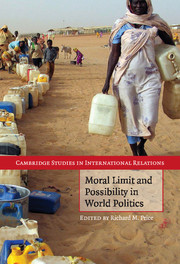Book contents
- Frontmatter
- Contents
- List of contributors
- Preface
- 1 Moral limit and possibility in world politics
- 2 Constructivism and the structure of ethical reasoning
- 3 The role of consequences, comparison and counterfactuals in constructivist ethical thought
- 4 Sovereignty, recognition and indigenous peoples
- 5 Policy hypocrisy or political compromise? Assessing the morality of US policy toward undocumented migrants
- 6 Lie to me: sanctions on Iraq, moral argument and the international politics of hypocrisy
- 7 Paradoxes in humanitarian intervention
- 8 Inevitable inequalities? Approaching gender equality and multiculturalism
- 9 Interstate community-building and the identity/difference predicament
- 10 Progress with a price
- Index
- Cambridge Studies in International Relations
- References
5 - Policy hypocrisy or political compromise? Assessing the morality of US policy toward undocumented migrants
Published online by Cambridge University Press: 14 May 2010
- Frontmatter
- Contents
- List of contributors
- Preface
- 1 Moral limit and possibility in world politics
- 2 Constructivism and the structure of ethical reasoning
- 3 The role of consequences, comparison and counterfactuals in constructivist ethical thought
- 4 Sovereignty, recognition and indigenous peoples
- 5 Policy hypocrisy or political compromise? Assessing the morality of US policy toward undocumented migrants
- 6 Lie to me: sanctions on Iraq, moral argument and the international politics of hypocrisy
- 7 Paradoxes in humanitarian intervention
- 8 Inevitable inequalities? Approaching gender equality and multiculturalism
- 9 Interstate community-building and the identity/difference predicament
- 10 Progress with a price
- Index
- Cambridge Studies in International Relations
- References
Summary
Introduction
Immigrant receiving countries like the USA frequently profess their desire to keep out undocumented migrants. They use strong rhetoric to convey this to those inside and outside the state, and they adopt policies aimed at doing so. Yet, many of these policies are either known to be deficient or are only selectively enforced. The USA for example ‘cracks down’ on undocumented migration with methods known to be generally unsuccessful in deterring migration, and all the while not addressing what is referred to by experts as the ‘linchpin’ of migration control: employer demand.
In short, many aspects of immigration policy, especially those policies directed at undocumented migrants, display a high degree of hypocrisy. How do we assess our policies directed at undocumented migration from a moral standpoint? Are our immigration policies, or our selective enforcement of them, by definition immoral because they are knowingly, even at times intentionally, designed to obscure – in this case most often to convince the public that something is being done to stop undocumented migration when in reality government actions are half-hearted and intended to appease many different audiences of which a generally restrictionist public is just one? Most of us would want to answer in the affirmative – the hypocrisy is by definition immoral. Furthermore, theorists of ethics looking at migration also tend to agree that our policies toward undocumented migrants are morally questionable.
- Type
- Chapter
- Information
- Moral Limit and Possibility in World Politics , pp. 138 - 164Publisher: Cambridge University PressPrint publication year: 2008
References
- 1
- Cited by



